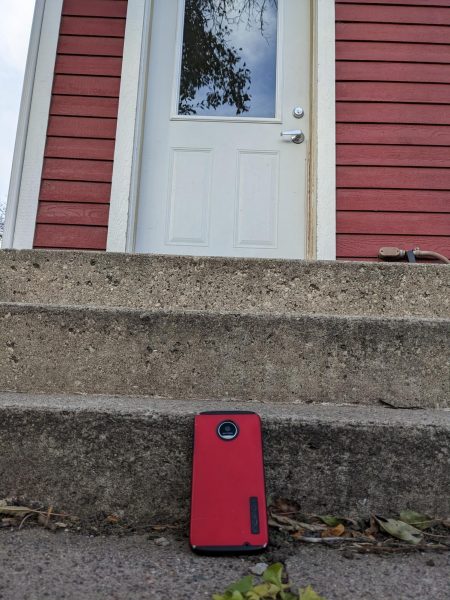“I’m sorry professor, TikTok ate my homework!”
December 13, 2021
It is finals week at Viterbo. A time when students, like myself, are frantic to cram for exams, hash out research papers, and catch up on late work. In my planner I have allotted time to make all this happen, to make finals week a breeze, so that I can slam the trunk lid on my luggage and head home for a well-deserved break. However, those crucial hours keep vanishing—consumed solely by one addictive app, TikTok. I can’t focus, time is wasting, my assignments are unfinished, but what do I tell my professors?
TikTok, for those living under a rock, is a fast-paced video app that allows its 1.1 billion users, worldwide, to view, comment on, record, and share 15-second videos. These scroll-to-watch videos cover all the bases of the user-generated content we love; such topics include pranks, cute animals, viral dances, lip synchs, original music, comedy sketches, fails or injuries, cringe-worthy content, etc. As users scroll and interact with the videos they watch, TikTok’s algorithm learns what it is you like and caters to your interests. TikTok also gives content-generating users the possibility to go viral as one-or-more of their videos or their business could “blow up” overnight.
Everyone and their grandma know that social media is addictive, but TikTok takes the cake when it comes to totally consuming a person. In an article by Forbes Magazine, TikTok is referred to as “digital crack cocaine,” as it can hook you from “the first hit.” Like playing slots, Forbes said that the differentiation of seeing a video you like and don’t like that keep you scrolling; it’s an activity, like drugs, I guess, that consistently releases dopamine from the pleasure center of the brain.
The platform is so good at keeping our attention it has trained us to keep it brief. In this same article by Forbes, whether it is an old movie from the 60s or our lives after graduation, students are wanting the action to happen now, they don’t want to wait for it. Students discussed in the article apparently “couldn’t even conceptualize a five-year plan.” One student, “after listening to a presentation by a 62-year-old senior vice president at Huawei, put up her hand and asked, without irony or humor, how she could start at his level,” Forbes wrote.
An article by The Breeze Newspaper explains how hours can be filled by TikTok stating, “…users can swipe for hours without noticing. This endless swiping trains the brain to judge the significance of things in the first 15 seconds of its discovery. This short attention span and quick-to-judge attitude can bleed into everyday activities… possibly leading to impatience and inattentiveness at jobs, schooling and even during conversations. Fresh content is only a swipe away, making it that much harder to take your eyes off the screen.”
With this knowledge one could feel justified knowing that it is not fully their fault, TikTok is addictive. Therefore, in those moments when I have sat down to study—but decided to watch just one video before I open my textbook—I can diagnose why I end up wasting two hours of my time. It is not because I am a bad student, but because I was unaware of the power TikTok was designed to have over me. So, I decided to investigate solutions of how to save myself; how I can start on the path to recovery and, in a sense, sober up.
As we have already touched on, an addiction can be difficult to shake. Now, if you judge me in stating that a TikTok addiction is cringe, go ahead, cringe away. But like any addiction there are steps you can take in overcoming one related to TikTok. Some I found useful are listed in a blog post by Youth Academy who recommend taking an entire day off TikTok and/or using your smartphone. You could also follow the “21 days rule” which guarantees you can break a habit by not opening TikTok or drastically reducing your time on the app for 21 days. During this time, seek out other activities like going for a walk in a park, grabbing lunch with a friend, taking a yoga class, etc. For severe cases, finding time to speak with your family, friends, or a counselor is strongly recommended.


